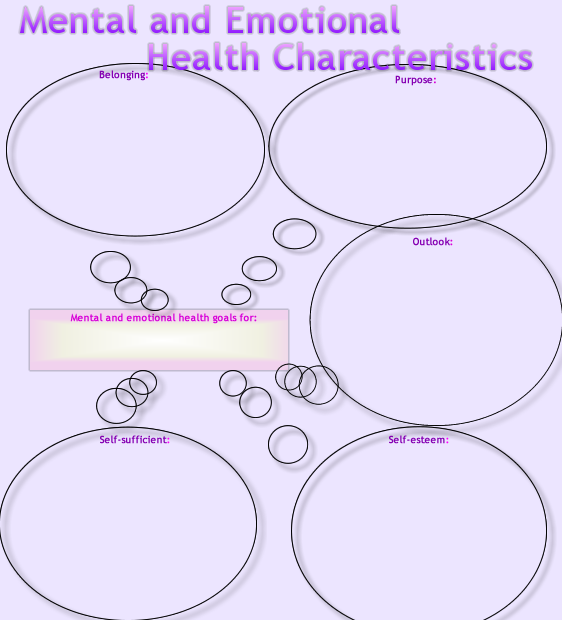Name : _______________________________
1. The following personal needs were recognized by this person and labeled as
___________________ Hierarchy of Needs
Number the following in order, with number 1 being the most important need in the hierarchy:
____ Safety needs
____ Esteem and being recognized
____ Belonging and love
____ Physical needs
____ Striving for self actualization and physical, social, and emotional success
2. Mental and emotional health characteristics: Identify a personal goal for each category. Write it in the appropriate bubble. Then describe an action or procedure that will achieve each goal.


1.
2.
3.
4.
4. Mental Health Terms -
Match the term with the appropriate explanation.
______ Constructive criticism
______ Character
______ Anxiety
______ Stress
______ Self-efficacy
______ Defense mechanisms
______ Coping
______ Traumatic event
______ Resilient
______ Alienation
______ Perception
- the belief in your ability to learn, change, accomplish success or failure
- the qualities that describe how a person thinks, feels, and behaves.
- ability to adapt and recover from disappointment, set-backs, crisis, or other goal blocking situations.
- the condition of feeling uneasy or worried about what might happen. Feelings that can be caused by real or imagined fears which are difficult to control and can cause a person to withdraw from activity, seek isolation, and develop physical illness, headaches, high blood pressure, and stomach disorders.
- the process of becoming aware of information with your senses (eyes, ears, nose, skin, and tongue)
- non-hostile comments that suggest a problem, assist in resolving it, and encourage positive change.
- dealing successfully with changes in life.
- a feeling of being isolated and separated from people.
- mental processes used to protect us from strong feelings and stressful emotions.
- a sudden and shocking situation that overwhelms all normal coping strategies that provided confidence and security. Accidents, natural disasters, violent assaults, suicides.
- the reaction of the body and mind to everyday opportunities, challenges, and demands. It is indicated by elevated amounts of adrenaline and cortisol in the blood stream which can have negative effects on the health of the body and its immune system. It is caused by conditions that are beyond a person's control.
Match the term with the appropriate explanation.
______ Group therapy
______ Apathy
______ Hostility
______ Emotions
______ Neurologist
______ Family therapy
______ Stigma
______ Integrity
______ Empathy
______ Hormones
- signals that effect how you feel and can consciously an unconsciously cause body reactions and behaviors.
- the ability to imagine and understand how someone else feels.
- when family members meets with a professional therapist to learn how to communicate better, understand each other, and seek solutions for problems in positive ways that bring the family together rather than tear them apart.
- when a group of people with a similar situation or problem meet regularly with a professional therapist to discuss ways to cope and live happy and productive lives.
- chemicals produced by your glands that regulate bodily actions and cell behaviors.
- the intentional use of unfriendly or offensive behaviors.
- sticking to core ethical values.
- the feeling associate with the loss of hope, lack of interest, enthusiasm, or concern.
- a mark or feeling of shame or disapproval that results from being isolated, shunned, or rejected by others.
- a doctor who specializes in the the brain, nerves, and nervous system.
Match the term with the appropriate explanation.
______ Depression
______ Panic disorder
______ Conduct disorders
______ Obsessive compulsive disorder
______ Phobia
______ Psychotherapy
______ Anorexia nervosa
______ Self-esteem
______ Drug therapy
______ Post traumatic stress disorder
- a sudden unexplained feeling of fear and terror. It can cause shaking, increased heart beat, shortness of breath, and dizziness.
- when a person is persistently (obsessive) driven (compulsive) by anxiety or fear to repeat a behavior over and over. Fear of germs, wash hands or use sanitizers...
- a mental and physical disorder characterized by loss of weight brought on by an unrealistic fear of weight gain, self-starvation, and conspicuous distortion of body image. Health is compromised and may be fatal. Latin definition means - nervous inability to eat.
- is the use of drugs to treat medical disorders.
- can happen after experiencing a terrifying event. Symptoms such as flashbacks, reliving the event, nightmares, guilt, reduced involvement with others, lack of emotional feelings, sleeplessness, problems focusing and concentrating, hyper-alertness, and exaggerated startle response.
- behaviors that interfere with the rights of others or basic rules of conduct. For example stealing, lying, aggression, violence, truancy, arson, or vandalism.
- the treatment of mental disorders with an ongoing discussion to find a cause and solution for a problem rather than by medical means alone.
- a mental state or prolonged feelings of helplessness, hopelessness, sadness, despair, apathy, and discouragement. Different than grief, which is caused by a real personal loss.
- the value, respect, and confidence you have for yourself.
- an irrational fear of something specific such as snakes, height, or social occasions.
5. A healthy mental and emotional life is achieved when a person has healthy ways of: belonging, a purpose of life, positive outlook, is self sufficient, and has positive self esteem. Most people who are healthy demonstrate it with respect to these five characteristics. However, they are also most likely able to manage emotions, manage and reduce stress, increase their immunity, cope with loss and grief, and deal with anxiety and depression.
Describe actions or procedures that can be used for two or more of these: manage emotions, manage and reduce stress, increase immunity, cope with loss and grief, or deal with anxiety and depression. Then identify which of them the procedure or action relates to and how it is known or thought to achieve positive results.
6. Describe two ideas you included on your personal coat of arms or shield that helps you with a positive state of mind.
1.
2.
7. Describe two ideas you believe are specifically human.
1.
2.